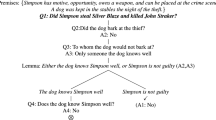Summary
According to the contemporary hermeneutical school the distinguishing feature of the humanities is the capability of the inquirer to communicate with the object of his inquiry. This idea underlies K.-O. Apel's model for the humanities adopted from psycho-analytical therapy. It is argued (1) that there is no sense in which the object of the historical inquiry can be regarded as aKommunikationspartner of the historian; and (2) that when the traditionalVerstehen doctrine is re-interpreted counterfactually (e.g., “If I were Caesar, then ...” substantiates my explanations of Caesar's actions), then the doctrine has an acceptable application to history and the charge of psychologism is removed.
Similar content being viewed by others
Literatur
Karl-Otto Apel, ‘Die Entfaltung der “sprachanalytischen” Philosophie und das Problem der “Geistwissenschaften”’,Philosophisches Jahrbuch 72 (1965) translated into English (by H. Holstelilie) asAnalytic Philosophy of Language and the Geisteswissenschaften, Foundation of Language, Suppl. Series Vol. 4, D. Reidel, Dordrecht (1967). References will be to the English translation; (b) ‘Szientifik, Hermeneutik, Ideologie-Kritik: Entwurf einer Wissenschaftslehre in erkenntnisanthropologischer Sicht’,Man and World, 1 (1968) 37–63; (c) ‘The A Priori of Communication and the Foundation of the Humanities’,Man and World, 5 (1972) 3–37.
Jürgen Habermas,Erkenntnis und Interesse, Suhrkamp, Frankfurt am Main (1968); English translation (by J. J. Shapiro) asKnowledge and Human Interests, Heinemann, London, (1972); references will be made to the English translation.
This has been questioned by Lauri Rauhala in ‘The Hermeneutic Metascience of Psychoanalysis’Man and World, 5 (1972) 273–297.
“The first condition of the possibility of historical science is that I myself am a historical being — that he whostudies history is the same as he who makes history” — Wilhelm Dilthey, quoted by Habermas,op. cit,. p. 149.
‘Szientifik, Hermeneutik, Ideologie-Kritik’, p. 62, n. 16. Cf. also G. Radnitzky,Contemporary Schools of Metascience, Göteborg, (1968), Vol. II, p. 21.
Ibid., pp. 45–50; ‘The A Priori of Communication and the Foundation of the Humanities’ p. 19f.
Apel repeats von Wright's version of the Logical Connection Argument in ‘The A priori of Communication and the Foundation of the Humanities’ p. 23f. Cf. Georg Henrik von Wright,Explanation and Understanding, Routledge and Kegan Paul, (1971), Ch. 3. For a criticism of von Wright's argument cf. Elazar Weinryb, ‘Von Wright on Historical Causation’,Inquiry 17 (1974), 327–338.
‘The A Priori of Communication and the Foundation of the Humanities’, p. 21.
Ibid., p. 18.
Ibid., p. 32.
Ibid., p. 24.
Analytic Philosophy of Language and the Geisteswissenschaften, p. 26.
Carl G. Hempel, ‘The Function of General Laws in History’ inTheories of History, ed. Patrick L. Gardiner, The Free Press, New York, (1959) 349–350.
Apel's target is not Hempel's formulation of his model but Abel's discussion ofVerstehen. Apel repeats an objection of Skjervheim whose book I was unable to consult. I took the liberty to confront Apel's attack on the neo-positivistic approach with Hempel's original discussion of historical explanation. For Apel, cf.Analytic Philosophy of Language and the Geisteswissenschaften, p. 29. For Abel, cf. ‘The Operation Called “Verstehen”’ inReadings in the Philosophy of Science, ed. H. Feigl and M. Brodbeck, Appleton-Century-Crofts, New York, (1953), pp. 677–688.
‘Szientifik, Hermeneutik, Ideologie-Kritik’, p. 51.
Ibid., p. 62, n. 16.
Stuart Hampshire,Thought and Action, Chatto and Windus, London, (1965), p.18–9
The recent analysis by David Lewis is a notable exception. My discussion is, however, confined only to the more conservative approach. Cf. David Lewis,Counterfactuals, Harvard University Press, Cambridge, Mass., (1973). Lewis discusses the conservative approach on pp. 65–77.
Cf. W. V. Quine,Methods of Logic, Routledge and Kegan Paul, London, (third ed., 1974), p. 21.
Author information
Authors and Affiliations
Rights and permissions
About this article
Cite this article
Weinryb, E. Hermeneutics and History. Zeitschrift für Allgemeine Wissenschaftstheorie 7, 327–339 (1976). https://doi.org/10.1007/BF01800769
Issue Date:
DOI: https://doi.org/10.1007/BF01800769



